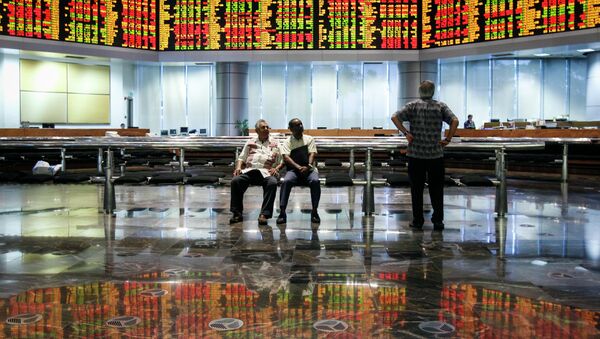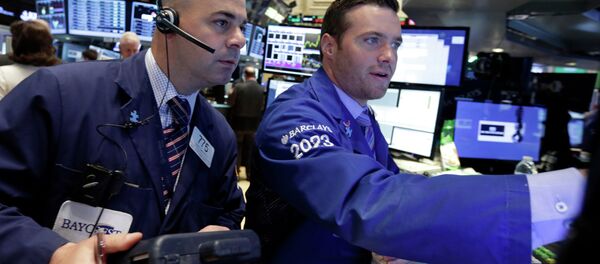Kristian Rouz – Amidst expectations of a soon increase in US borrowing costs, America’s assets are being swept up by robust investors’ demand, pushing the greenback above its level of valuation last seen in 2002.
US equities rallied toward the close on Wednesday, making up for the losses of the previous day, as robust gains in tech shares pushed the Nasdaq Index above its record highest. The Nasdaq Composite added 1.47%, culminating at 5,106.59 points as Apple’s shares rose 1.9%. However, future bets on Apple’s stock declined 0.08% overnight.
The S&P 500 Index rose 0.92%, settling at 2,123.48, just below its all-time highest seen last week. The index was also driven by tech and healthcare equities, as cutting-edge sector of the US economy are most prominent beneficiaries of its accelerated growth.
25 out of the 30 sectors on the Dow ended the day in the green, propelling the index just 0.67% higher. Volatility is rife on Wall Street amidst the abundance of investment capital, of both foreign and domestic origin. Any asset, as long as it is rooted in the US economy, is meeting overwhelming demand, the US dollar no exception.
Nonetheless, given the US Fed is determined to raise borrowing costs this year, supported by solid US macroeconomic data, the dollar is expected to advance to 126 yen and $1.03 against the euro by late 2015.
Asian shares were down in Thursday’s trading, weighed on by great losses in mainland China. The CSI 300 Index slumped 7% after Beijing tightened its margin-trading regulation. Chinese authorities fear a bubble might emerge in the profitable area of trading in unsecured assets. However, the crackdown on margin trading is ill news for China’s equity markets, which are mostly speculative given the scarce presence of investment capital in the Communist nation.
The Shanghai Composite crashed 6.5% as regional investors were selling off stock in panic, triggered by Beijing’s tightening of the trading rules. In Hong Kong, shares dropped 2.3%, and Australia’s S&P/ASX 200 Index also declined 0.2% on the soft corporate data.
However, in Japan equity markets soared as the weak yen boosted exporters’ profits outlook. The Nikkei 225 hit its 15-year highest, adding 0.38% to 20,551.26 points.
In the UK, however, equity market rallied with the FTSE 100 Index rising 0.15% after consumer spending and investment data indicated ninth consecutive quarter of expansion in the kingdom’s economy. British GDP added 0.3% in Q1, the actual data confirming a previous forecast by the Office for National Statistics. However, the UK’s economy is still driven largely by domestic demand, while the Conservative government of David Cameron promised a sway towards more reliance on exports five years ago. A strong sterling might be to blame as British exports slid 0.3% and imports rose 2.3%, cutting about 0.9% off the quarterly economic expansion. Consumer spending added 0.5%, and investment rose 1.7%.
The looming hike in US borrowing costs is gradually reshaping the landscape of international trade. Investment capital is explicitly seeking safe havens, while the export-reliant Germany and Japan are benefitting from the stronger dollar environment. Economic confidence is high in most developed nations due to influx of foreign money. The current scheme of global capital movement provides for the money now flooding the market of tech equities is more often than not originating from the less sustainable exploitation of natural resources and/or dirt cheap labour in the Third World nations.





